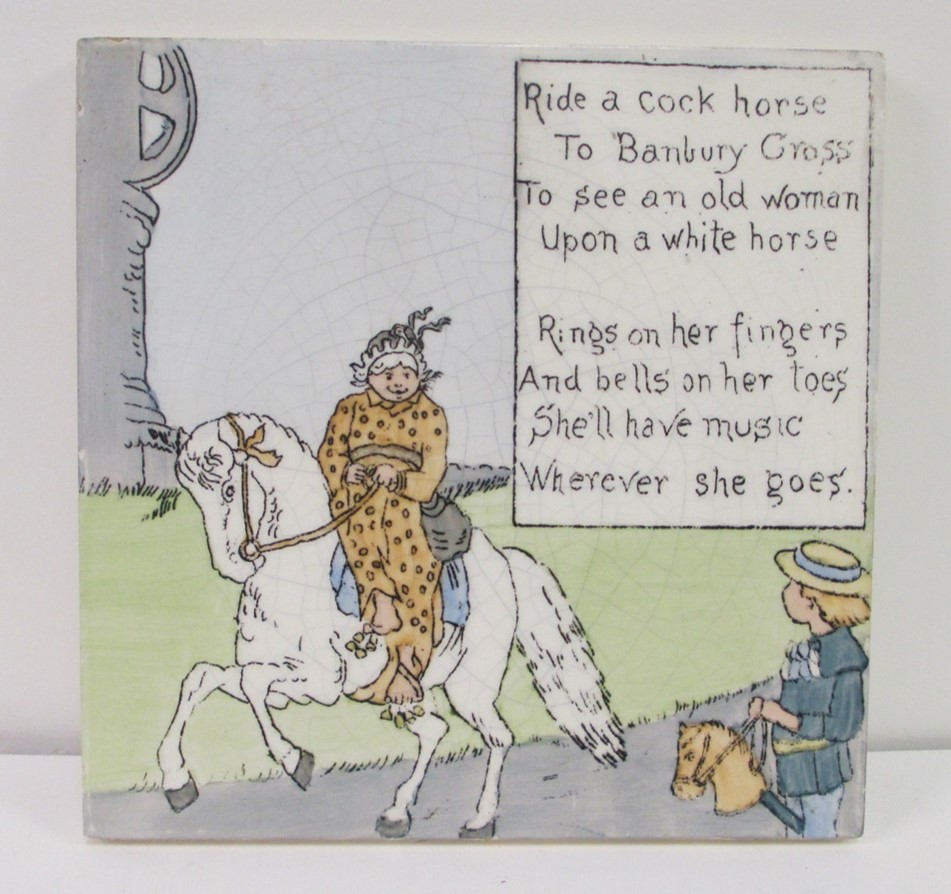American Encaustic Tiling Co. (A.E.T.) was one of several tile manufacturers located in Zanesville, Ohio in the late nineteenth and early twentieth centuries. The company opened in 1875, intending to produce goods that could compete with the recent large influx of English tiles, which Americans had been importing to decorate their homes. In its early decades, A.E.T. was on the cutting edge of tile production in the United States and, by 1890, it was the believed to be the largest tile company in the world. Tile designs ranged from geometric and classical to large, custom-made relief scenes that spread across several tiles, as well as inlaid floor tiles and playful designs made for children. The company employed a number of production techniques, beginning with the encaustic method, and eventually expanded to glazed, embossed, and even hand painted tiles. Numerous important American and European designers joined A.E.T. throughout its history, each introducing unique stylistic programs that diversified the company’s product lines. Despite the increase of ceramic tiles’ popularity with buyers, A.E.T. merged with another manufacturer in 1935 due to economic pressures stemming from of the Great Depression. As early as 1890, A.E.T. produced sets of tiles intended for children, with decal designs taken directly from illustrations in the popular contemporary children’s books Baby’s Own Opera and Baby’s Own Aesop Fables. In later decades, the company developed an additional series of tiles representing such familiar nursery rhymes as “Little Bo Peep,” “Little Boy Blue, and “Jack and Jill.” These charming tiles included the full rhyme accompanied by an illustrated scene, and they most commonly decorated nursery fireplaces or children’s bathrooms. A.E.T. produced at least nineteen tiles in the series, including this tile, which depicts the popular English nursery rhyme “Ride a Cock Horse to Banbury Cross.” The text of the eighteenth-century poem describes a child playing with a toy horse while making the journey to the town of Banbury, in the southeast of England. Ride a cock horse to Banbury Cross, To see a fine lady upon a white horse; Rings on her fingers and bells on her toes, And she shall have music wherever she goes.During his excursion to Banbury Cross, the child encounters a fabulous, yet eccentric, woman who rides a great horse and wears rings on her fingers and jingling bells on her feet. The entire rhyme is printed on the tile above the sweet and playful illustration of a young boy with his toy horse and the peculiar woman on her large steed. This tile is currently on view in the newly opened exhibition The Art of the Tile, which features a selection of the Everson’s expansive collection of ceramic tiles.-Sarah Poisner, Curatorial InternImage caption: American Encaustic Tiling Co., Nursery Rhyme Tile, ca. 1900-1920, earthenware, 6 x 6 inches, Everson Museum of Art; Gift of the Mary and Paul Brandwein Collection, 90.250.53


